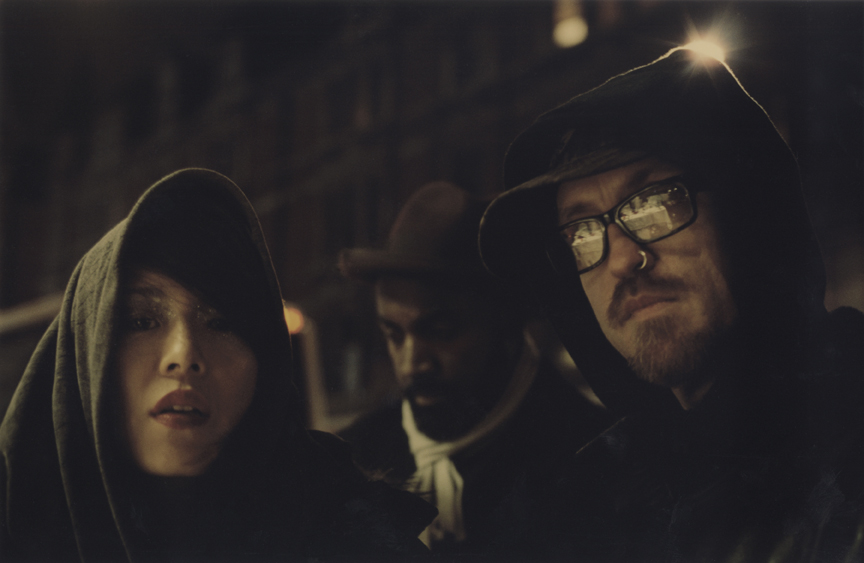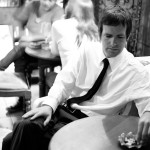
Words by Andrew Parks
If self-titled had to make a short list of our favorite living producers, Kevin Martin would rank right up near the top, in the spot most people reserve for the Kanye Wests and Aphex Twins of the world. Whether we’re talking about his early post-apocalyptic projects with Justin Broadrick (Techno Animal, Ice, GOD) or the Dick-ish–as in Philip K.–dub of the Bug, Martin has proved to be one of the bravest beat makers in the business.
This is especially true of his current trio King Midas Sound, an ever-evolving entity that’s gone from the dread-chased cuts of Waiting For You to the road-seasoned reinterpretations/remixes of this fall’s Without You collection, which includes contributions from Gang Gang Dance, Mala, Hype Williams and many more. Check out an exclusive video premiere from the eagerly awaited record below, along with an extensive, exclusive talk with Martin about everything from his undying love of Jamaican music to the chances of us hearing another record from his brain trust with Broadrick…
“Guess I’m a slow learner, but I’ve realized sonic sickness hits heavier when surrounded by the sweetest hooks”
So I’m going to start with an obvious question: why did you decide to make the next King Midas Sound record a collection of remixes/reinterpretations from Waiting For You as opposed to a whole new album?
I think Roger, Kiki and I felt we wanted time to develop our live show and work on new material for the next studio album, and that is going to take time, particularly as we have been playing live so much in the last year and I am very late in delivering my Bug follow up to London Zoo. So we all felt that there was much scope for re-invention with Waiting For You; particularly as we are all reggae/dub casualties, and feel songs can and should be infinite, not just finite product.
I also think it has taken us time to fully digest our debut album, and the deep emotional/musical range it covers. Having toured a lot and been surprised by meeting so many kindred spirits along the way–who have given us amazing feedback for the record–we felt it would be appropriate to reformat Waiting For You in a fresh way, and invite these new, close allies to reinterpret some of the material.
In a way, is the new King Midas Sound record a bit like Massive Attack’s No Protection album, only in this case you have numerous artists/producers reinventing your songs more than one specific act?
To be honest, I don’t see any connection. The connection is to reggae, dub and versions. They asked Mad Professor to put his stamp on that album, whereas we have chosen collaborators who we feel are very much on our wavelength as either singers or producers, like Green Gartside, dBridge, Joel Ford and Cooly G. And we linked up with people like Mala, Ras G, Nite Jewel, Echospace, Hype WIlliams and Jamie Vex’d, as we feel a kinship with these artists who exist beyond the borders and formulas. We like exploring the freak zones where originality is the key. The forthcoming revisioned/reversioned album Without You is about collaboration and mutation; it’s not just another hire-the-big-names marketing product. We worked with people we know and/or respect.
Can you tell us about a couple specific tracks on the record–how they generally sound in comparison to the original versions?
I guess the album is split between vocal reinterpretations–where we invited vocalists to write lyrics to the original unchanged rhythms from Waiting For You–and producers revamping songs from the album. It’s been fascinating to hear the process in action. On one hand, hearing someone like dBridge sing with a voice of an angel is a major thrill, as you view the original track (“Blue”) in a totally different light after hearing him re-voice it. It’s literally magical. And likewise, hearing Mala or Jamie turn “Earth a Kill Ya” or “Goodbye Girl” respectively inside out and upside down is sheer genius, as it makes me rethink how I work and reassess my approach to sound/music in general.
How would you describe the direction King Midas Sound is headed next? I get the sense that things are getting heavier, noisier, and more dynamic in general–coming full circle with your early projects like Ice, GOD, etc.
It’s always so difficult to have an overview on your own sound, but our approach to the live shows has definitely inspired a major change in sound/direction. I remember we played a festival at Mutek, and a guy from a really great blog called Passion of the Weiss reviewed the show, saying we sounded like My Bloody Valentine in dub. [That’s] extremely flattering but it was initially a confusing and unexpected reaction. The idea of huge sound waves of bass and fuzz alternating between near silence and crescendo is definitely what we are working towards. I basically began by being at war with the vocals in the live arena, as I tried to find the right approach for KMS live. And as the first shows didn’t work as we wanted them, I decided I would re-arrange songs and the sonic impact to accomadate Roger and Kiki’s beautiful voices–hopefully playing to their strenghs and mine.
I wouldn’t say it’s a return to my noise-fest past at all, but there are elements of sonic avalanche in there. [Laughs] I’ve just begun to overcome my fear of melody and distrust of structure. Guess I’m a slow learner, but I’ve realized sonic sickness hits heavier when surrounded by the sweetest hooks. I had an aversion to songs and mistrust of formulas for many years and sought musical year zero, but now I want the fresh challenge of writing stupidly intense songs.
“After playing to the hordes of black clad miserable bastard males for years, it was a nice surprise”
Has your work in King Midas Sound bled into your solo productions as the Bug? I assume so since the song “Catch a Fire” on your recent Infected EP could pass as a KMS tune.
I wanted to rewrite “Skeng” to see if I could make something beautiful out of a tune so ugly and heavy. “Catch A Fire” was an attempt to see if it was possible. Having Kiki sing on it would obviously encourage parallels to KMS, but that doesn’t bother me. I like being a catalyst for confusion and chaos sometimes. [Laughs] I love the fact that Jamaican music would re-route old rhythms, revoice classics and torch their own rule book at the drop of a hat, in the quest for even better versions of each song or rhythm. It’s not always gonna work, but when it does, the results can be sublime.
Rules and formula just encourages conservatism in music, so why not buck the trends and attack the middle mass? I play a major part in both projects, so I don’t see any need to create artificial divisions between them. If there’s overlap, so be it; it’s no stress for me, just annoying for the industry.
Speaking of “Catch a Fire,” that song features some guitar work from your old buddy Justin Broadrick. While the two of you haven’t worked on a project in quite some time, your careers have maintained a similar spirit of experimentation with every record you release. Any chance we’ll hear a full album from the two of you anytime soon?
Justin’s like a soul brother to me. I would always hope to keep working with him. I massively respect his bravery and vision musically, asides from his obvious talents as a musician/vocalist. Without him, I wouldn’t be doing what I’m doing today, cause he had so much patience and taught me so much in the early days of GOD and Techno Animal regarding the studio. We are already doing some more collaborations, and hopefully if we have a strong enough idea further down the line, there will be some form of major project.
Going back to the beginning of your Bug project, is it true that you played your earliest Bug material near the end of a Techno Animal set, and that the experience helped you realize how the Bug could work in ways GOD/Ice/Techno Animal couldn’t–music that’s more danceable and inviting?
Yeah, true. We played a show in Switzerland with Techno Animal, and had time to spare at the end of the set, so I dropped some fledgling Bug demos and the response was instant and hilarious, as all the black clad dudes looked lost and surprised, and their girls started heavily gyrating. [Laughs Me and Justin laughed afterwards about how there there seemed to be some crazy magnetism to the early Bug rhythms…After playing to the hordes of black clad miserable bastard males for years, it was a nice surprise; particularly considering those Bug rhythms were no less noisy than Techno Animal’s.
Since you’d spent so many years working with other musicians, were you anxious about performing/recording on your own at first?
Very much so–particular working without Justin, as we had been working together for over 10 years at that point. Of course it seems like a huge jump into the unknown without a safety net, with no one to blame but yourself. [Laughs] But it was also incredibly liberating and challenging, so adrenaline was released in both cases. It was very exiting. And yet, now being heavily involved in KMS, I am finding it being great being back in the band format again.
Six years separated your first record under the Bug name (1997’s Tapping the Conversation) and its proper follow-up, Pressure. Did you scrap a lot of material during that time?
No, not really. I was still heavily involved with making the Ice album (1998’s Bad Blood), and Techno Animal recordings.
“Being there ‘first’ means nothing to me. I am more interested in what I make next.”
It took you another five years to finish London Zoo. I’ve read that you were frustrated with the final product at first because you’re such a perfectionist. Did you feel the same way about Waiting For You, or did you feel more comfortable with the King Midas Sound sessions right away?
I basically feel it is impossible to be 100-percent happy with any recording, as it’s almost an impossible dream. London Zoo was a long, heavy trip to complete, and Waiting For You ended up taking a similar length of time. The pressure once you have completed a record you are even vaguely happy with is always daunting. But the plan to find a zonal sound for Waiting For You was perhaps a little less arduous to achieve than the complex sound world I wanted to outline with London Zoo.
When you try and finish an original album, it is also impossible to tell if you have been successful as there is little to compare it to, but I guess that is the thrill or challenge. I just know with Waiting For You that Kiki definitely sealed it sweetly by being the final part of the puzzle, and i felt we cam close to achieving the overall mood of seduction and melancholy that we had set out to address.
Now that dubstep is part of the pop music landscape in London, do you find it a tad ironic that you were doing the same thing way back in the early ’00s, utterly confusing most audiences who didn’t know what to make of that music?
You know, I’m totally happy for all those involved. I have met some really great people like Kode9, Loefah, Mala, etc/ in that scene, and I think there has been some incredible music released via dubstep. Any scene that can loosely include Shackleton, Burial, James Blake or Vex’d has got to have a good thing going. It’s funny to have been in the middle of an exploding scene like dubstep, but not actually feel part of it intrinsically.
People like Skream are incredibly talented. I would rather they taste success than the Simon Cowell hit factory. Being there “first” means nothing to me. I am more interested in what I make next. For sure, Techno Animal or Scorn or Wordsound were deep into creating intense, deviant bass culture before many others, but so what. [Laughs] It was tough then, particularly trying to get people to grasp a fresh sound, but I enjoyed the struggle too. Now it just makes it harder to know where to go next that will still sound original; that’s always the challenge.
Do you find yourself listening to any music that’d fall under that umbrella anymore, or do you tend to listen to old records more than new ones? (Judging by the contributors on your new record, I’d assume your tastes are as varied as ever.)
At the moment, I am listening to new stuff by Panda Bear, Mika Vainio, Little Dragon, Hype Williams, Clouds, Emptyset, Raekwon, etc. so, yeah, I still fish far and wide for music with fire in its belly or deviance in its brain. I need new music; I need to be inspired and take it as a challenge in the best sense.
“All the music I cherished most had a fierce anti-social drive and fuck you attitude which I still look for in music”
Going off on a bit of a tangent, I was wondering when you were first exposed to dub/Jamaican music. Did it split your head open like the first time you heard extreme music like punk, metal and industrial?
Yeah definitely. The sense of experimentation, and the alien sounds, lyrics and references were so extreme for me at a very early age. Rather than settling for avant-wank, there is a deep soulfulness, acute political awareness and carnal thrust to so much of the music that emerges from Jamaica which is really appealing. Reggae is the only music I can listen to all day and all night without getting bored, as there’s so much diversity within its own subdivisions.
And I guess having grown up with Discharge, PiL, Killing Joke, Throbbing Gristle, etc., there was a “rebel” stance and anti-system/structural attack which I loved so much about reggae. It was largely John Peel that turned me onto reggae in the first place; him and older punks who played me King Tubby or deep Prince Far I tunes. Post punk and reggae were inseparable in the UK, and I feel it’s remained intrinsic to what I do…It’s still my love of the friction caused by culture clashes which fuels the energy in the music I make today. And basically all the music I cherished most from hip-hop to reggae to post-punk had a fierce anti-social drive and fuck you attitude which I still look for in music…
Do you feel like you’re still striving to write a 21st century form of dub with everything you do because straight-up revisiting Jamaican music wouldn’t feel as genuine?
You know, it’s not so precise, and I wouldn’t frame it in that way…But I definitely have the curse of always wanting to move forward and surprise myself. And yeah, I definitely didn’t wanna recreate Jamaican music–what’s the point? Obviously influences have also come from every direction, not just the Caribbean. To be honest, Jamaican music has become much more mongrel, and influenced by music from everywhere else, too. I think the world has become so small and the ‘net has shrunk it to insane proportions, where all music is impure and hybrid. Both a good and bad thing perhaps, but irresistible nonetheless.
“That can obviously lead to rubbish too”
One of the great things about Waiting For You is how natural your collaborations sound with Roger and Kiki. I know you started working with the former about a decade ago, but when did you first meet the two of them, and how would you describe their roles in King Midas Sound today?
We all have totally equal say in King Midas, and despite [her] appearance, Kiki is probably the most hardcore of the three of us. [Laughs] I first heard her voice in Japan, when she sang on a track by her crazy breakcore dub band Dokkebi Q, and coincidentally saw them play the day I got back to London from that Asian trip. I sensed instantly she had TNT in her belly and a voice to kill for. I’ve always loved heavy music with deceptively sweet elements or voices placed on top.
I’ve been inspired by Roger since first bumping into him via a mutual friend over 10 years ago. I had already heard him before that chance meeting and was hypnotized by his tone and words. He truly had wordsoundpower. I was so impressed by his messages and delivery that I invited Roger to appear live and on record with Techno Animal. Basically, I would be happy listening to Roger just recite the alphabet, as he has such an extraordinary presence and aura, let alone incredible literary skills. And you know this isn’t just ass-licking, I actually feel very lucky to be working with them both. They push me and we are trying to do something really fresh and idiosyncratically different.
You played the sax and contributed vocals to GOD early on in your career. Do you ever miss doing either?
No, not really, as i was an average vocalist, and the sax was pure sound generation, not played in any way traditionally. Although maybe in hindsight, I liked the physicality both demand, and enjoyed the sheer blast of loud emotional outburst which I was prone to. [Laughs]
You were also a journalist for many years. What did you learn from that experience overall, and what do you think about the direction journalism has gone in, where it’s been democratized by blogs and generally become much more negative than ‘music criticism’ ever was?
What I love about the best music journalists (like Kodwo Eshwun) is the intensity and sheer volume of incredible ideas and concepts. Music writing is actually so difficult to get right, as it’s almost impossible to pin music down to words, and maybe at worst takes away the magic from the music, which more often than not is the sheer what-the-fuck factor or the mysterious unknown elements which links musician to audience. I respect anyone that tries to find a new vocabulary or is capable of explosive cerebral brain blasts when writing about music like Lester Bangs did. I dig a lot of blogs, as it frees the writing up from editorial interference, but that can obviously lead to rubbish too.
I look for good writing to turn me onto good music, the same as I have always done…The best music writing can nearly equal the inspirational qualities of music. It’s an art form just like music making. But the danger of the worst music writing is not to succumb to the hype, and fall for music because of the blurb around it. [Laughs] I personally feel my connection to music is more often or not instinctive, and what I want from the best writing is hard info and electrifying concepts..
“I see the best music as being an affirmation of life”
One of the things I love about your music is how unpredictable it’s always been; how it’s very much fueled by extremes, whether that means actual literal noise or something that’s very ‘heavy’ in a different way. (Like how Waiting For You evokes dread and paranoia so perfectly). Do you feel like that’s the one thread that connects all of your work–the pursuit of extremes?
I think you’re right, yeah. I seem to have a thirst for the seductively beautiful or extremely fuckin’ ugly in music. [Laughs] I’m not really a fan of the middle mass. I guess I feel you have one life only, and I want to experience the most of it i can. And so much music is boring in the middle ground; mostly being made for money and/or fame. I love the mavericks and outcasts who don’t fit into that product-led equation. I see the best music as being an affirmation of life.
What can we expect from you next? Albums from Black Chow (Martin’s duo with Kiki) or Ladybug (The Bug working solely with female vocalists)? What about that dub record with Adrian Sherwood? Do you consider Adrian one of the foremost inspirations behind the Bug?
Adrian and his On-U-Sound label was a crucial influence on me early on. African Headcharge and Creation Rebel in particular blew my head off with their heaviness and psychedelia. It seemed to simultaneously saturate mind and body.
The dub album with Adrian isn’t going to happen unfortunately. I just decided I preferred to work on a new phase of Bug music and KMS…Black Chow material is being worked on on a non-regular basis without industry pressure, which is totally important for it to thrive. And we have developed a deep, bittersweet sound, which we are working on at the moment. It’s very promising. Ladybug [has] zero plans at present. My main problem is how to clone myself or find a way to divide myself into many parts, as there never seems to be enough hours in the day, and I’m a particularly slow, meticulous worker.
Anything else you’d like to add? Can we expect you in the U.S. again anytime soon?
I am actually very hungry to come to the States again, and would dearly love to play in Central/South America too. Kid Kameleon set up an amazing tour of the U.S. a couple years ago for me, which was an amazing experience, and when me and Warrior Queen supported Nine Inch Nails at Trent Reznor’s request throughout the Midwest, that was a crazy eye-opening tour, too. I dig the sheer scale and rich experiences that America offers every time.
So yes, please book me yesterday! [Laughs] I will be interested to see what America makes of King Midas Sound live, as we definitely polarized Mutek, where half the crowd seemed ecstatic, and the other half fuckin’ hated it. [Laughs] Also: since gettin’ hooked on modular synths, there are so many great developers in America I would love to link with…



